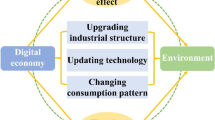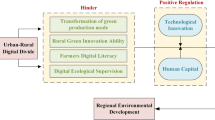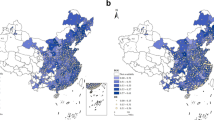Abstract
The main objectives of this study incorporate the ecological environment index (ENV) and the digital economy index (DIG) into the environmental Kuznets (EKC) model and examine the income effects, scale effects, structural effects, technology effects, and government expenditures on the ecological environment, collating panel data for 31 provincial administrative regions in China over the period 2011–2019. The panel entropy value method was first applied to calculate the ecological environment index (ENV) and the digital economy composite index (DIG). Secondly, a threshold effect test is conducted with the digital economy as the threshold variable, and it is found that there are two threshold values in the model. From the threshold regression results, the impact of the digital economy on the ecological environment shows a positive “U” shape. At this stage, except for individual years in each province, most of the provinces are in the second half of the positive “U” curve. The coefficients of the income effect and scale effect are not significant, while the coefficients of structural effect and technology effect and government expenditure are significantly positive. From the results of the study, it is clear that the digital economy has a significant contribution to the improvement of the ecological environment in China at this stage. Policymakers should go further to promote the development of the digital economy while encouraging regional industrial structure optimization and increasing technological input support to ensure that the environment and economic development are coordinated in the digital economy era.

Similar content being viewed by others
Data availability
The data are available upon request from the corresponding author.
References
Al-mulali U, Tang CF, Ozturk I (2015) Does financial development reduce environmental degradation? Evidence from a panel study of129 countries. Environ Sci Pollut Res 22:14891–14900
Anoruo E (2011) Testing for linear and nonlinear causality between crude oil price changes and stock market returns. Int J Eco Sci Appl Re 4(3):75–92
Anwar A, Chaudhary AR, Malik S (2022a) Modeling the macroeconomic determinants of environmental degradation in E‐7 countries: the role of technological innovation and institutional quality. J Public Aff e2834
Anwar A, Malik S (2021) Cogitating the role of technological innovation and institutional quality on environmental degradation in G-7 countries. Int J Grn Econ 15(3):213–232
Anwar A, Malik S, Ahmad P (2022b) Cogitating the role of technological innovation and institutional quality in formulating the sustainable development goal policies for E7 countries: evidence from quantile regression. Glob Bus Rev 09721509211072657
Apergis N, Ozturk I (2015) Testing environmental Kuznets curve hypothesis in Asian countries. Ecol Indic 52:16–22
Chang Y, Hou K, Wu Y, Li X, Zhang J (2019) A conceptual framework for establishing the index system of ecological environment evaluation–a case study of the upper Hanjiang River. China. Ecol Indic 107:105568
Chao XJ, Ren B (2011) The fluctuation and regional difference of quality of economic growth in China. J Econ Res 46(4):26–40
Che CM (2013) Panel threshold analysis of Taiwan’s outbound visitors[J]. Econ Model 33:787–793
Chen X (2018) Trend analysis of technology convergence and application innovation in digital economy era. Sco Sci 08:8–23 ((In Chinese))
Chow GC, Li J (2014) Environmental Kuznets curve: conclusive econometric evidence for CO2. Pac Econ Rev 19(1):1–7
Cohen G, Jalles JT, Loungani P, Marto R (2018) The long-run decoupling of emissions and output: evidence from the largest emitters. Energy Policy 118:58–68
Destek MA, Ulucak R, Dogan E (2018) Analyzing the environmental Kuznets curve for the EU countries: the role of ecological footprint. Environ Sci Pollut Res Int 25:29387–29396
Dogan E, Turkekul B (2016) CO2 emissions, real output, energy consumption, trade, urbanization and financial development: testing the EKC hypothesis for the USA. Environ Sci Pollut Res Int 23:1203–1213
Dong C, Dong X, Jiang Q, Dong K, Liu G (2018) What is the probability of achieving the carbon dioxide emission targets ofthe Paris agreement? Evidence from the top ten emitters. Sci Total Environ 622:1294–1303
Dong F, Hu M, Gao Y, Liu Y, Zhu J, Pan Y (2022) How does digital economy affect carbon emissions? Evidence from global 60 countries. Sci Total Environ 852:158401
Grossman GM, Krueger AB (1991) Environmental impacts of a North American free trade agreement. National Bureau of Economics Research Working Paper, No. 3194, NBER: Cambridge
Grossman GM, Krueger AB (1995) Economic growth and the environment. Q J Econ 110(2):353–377
Guo H, Li Y (2019) Cooperative regulation between government and platform company in the digital economy. Chin Publ Admin 10:56–61 ((In Chinese))
Guo J, Liang S (2021) The impact mechanism of the digital economy on China's total factor productivity: an uplifting effect or a restraining effect? S China Econ J 10:9–27 ((In Chinese))
Habiba UMME, Xinbang C, Anwar A (2022) Do green technology innovations, financial development, and renewable energy use help to curb carbon emissions? Renew Energ 193:1082–1093
Hansen BE (1999) Threshold effects in non-dynamic panels: Estimation, testing, and inference. J Econom 93(2):345–368
He W, Wen J, Zhang M (2022) Research on the impact of digital economy development on China’s green ecological efficiency: based on two-way fixed effects model. Econ Prob 01:1–8+30 ((In Chinese))
Jing W, Sun B (2019) Digital economy promotes high-quality economic development:a theoretical analysis framework. Economist 02:66–73 ((In Chinese))
Khan A, Ximei W (2022) Digital economy and environmental sustainability: do information communication and technology (ICT) and economic complexity matter? Int J Env Res Pub He 19(19):12301
Kuznets S (1955) Economic growth and income inequality. Am Econ Rev 45(1):1–28
Li X, Liu J, Ni P (2021a) The impact of the digital economy on CO2 emissions: a theoretical and empirical analysis. Sustainability 13(13):7267
Li Z, Li N, Wen H (2021b) Digital economy and environmental quality: Evidence from 217 cities in China. Sustain 13(14):8058
Li G, Zhou X, Bao Z (2022) A win–win opportunity: the industrial pollution reduction effect of digital economy development—a quasi-natural experiment based on the “broadband China”strategy. Sustain 14(9):5583
Lind JT, Mehlum H (2010) With or without U? The appropriate test for a U-shaped relationship. Oxford B Econ Stat 72(1):109–118
Liu L, Anwar A, Irmak E, Pelit I (2022a) Asymmetric linkages between public-private partnership, environmental innovation, and transport emissions. Econ Res-Econ Istraz 35(1):6519–6540
Liu H, Anwar A, Razzaq A, Yang L (2022b) The key role of renewable energy consumption, technological innovation and institutional quality in formulating the SDG policies for emerging economies: evidence from quantile regression. Energy Rep 8:11810–11824
López R, Galinato GI, Islam F (2011) Fiscal spending and the environment: theory and empirics. J Environ Econ Manag 62:180–198
Pang J, Jiao F, Zhang Y (2022) an analysis of the impact of the digital economy on high-quality economic development in China—a study based on the effects of supply and demand. Sustainability 14(24):16991
Po WC, Huang BN (2008) Tourism development and economic growth–a nonlinear approach. Physica A 387(22):5535–5542
Qing Q, Wang Y (2019) Dynamic evaluation and study on difference of eco-environmental quality in the provinces. China Environ Sci 39(02):750–756 ((In Chinese))
Sasabuchi S (1980) A test of a multivariate normal mean with composite hypotheses determined by linear inequalities. Biometrika 67(2):429–439
Shafik N (1994) Economic development and environmental quality: an econometric analysis. Oxford Econ Pap 46:757–773
Shen X, Zhao H, Yu J, Wan Z, He T, Liu J (2022) Digital economy and ecological performance: evidence from a spatial panel data in China. Front Env Sci-Switz 1618
Shi Z, Wang Y, Zhao Q (2023) Analysis of spatiotemporal changes of ecological environment quality and its coupling coordination with urbanization in the Yangtze River Delta urban agglomeration, China. Int J Env Res Pub He 20(2):1627
Shirazi F, Hajli N (2021) IT-enabled sustainable innovation and the global digital divides. Sustainability 13(17):9711
Song Y (2019) Digital economy and high-quality development from the perspective of economic development quality theory. Guizhou Soc Sci 11:102–108 ((In Chinese))
Stokey NL (1998) Are there limits to growth?.Int Econ Rev 1–31
Sui DZ, Rejeski DW (2002) Environmental impacts of the emerging digital economy: the e-for-environment e-commerce? Environ Manag 29:155–163
Sun Y, Anwar A, Razzaq A, Liang X, Siddique M (2022) Asymmetric role of renewable energy, green innovation, and globalization in deriving environmental sustainability: evidence from top-10 polluted countries. Renew Energ 185:280–290
Thompson A (2014) Environmental Kuznets curve for water pollution: the case of border countries. M Econ 2014
Tong L, Guo C (2013) Power Expansion, Alienation and regulation path of big data. J Commer Econ 04:190–192 ((In Chinese))
Tscherning K, Helming K, Krippner B et al (2012) Does research applying the DPSIR framework support decision making? Land Use Policy 29(1):102–110
Wang R, Ding C (2023) Bilateral impact of digital economy on air pollution: emissions increase and reduction effects. Front Env Sci-Switz 11:219
Wang W, Wang J (2019) Research on trend and policy of digital economy development in China. Econ Rev J 01:69–75 ((In Chinese))
Wen Y, Shabbir MS, Haseeb M, Kamal M, Anwar A, Khan MF, Malik S (2022) The dynamic effect of information and communication technology and renewable energy on CO2 emission: fresh evidence from panel quantile regression. Front Env Sci-Switz 1123
Wu C, Gao Y (2020) Research on the mechanism and effect of digital economy driving the development of lowcarbon industries. Guizhou Soc Sci 11:155–161 ((In Chinese))
Wu X, Qin Y, Xie Q, Zhang Y (2022) The mediating and moderating effects of the digital economy on PM2. 5: Evidence from China. Sustain 14(23):16032
Xiang X, Yang G, Sun H (2022) The impact of the digital economy on low-carbon, inclusive growth: promoting or restraining. Sustainability 14(12):7187
Xu S, Yang C, Huang Z, Failler P (2022) Interaction between digital economy and environmental pollution: new evidence from a spatial perspective. Int J Env Res Pub He 19(9):5074
Yang H, Zhang L (2020) The digital economy revolution and its contradictory movements. Contemp Econ Res 01:22–34+112 ((In Chinese))
Yang L, Sun Z (2015) The development of western new-type urbanization level evaluation based on entropy method. Econ Prob 03:115–119 ((In Chinese))
Yang S, Jia J (2022) Digital economy, technological innovation, and environmental quality improvement. Sustainability 14(22):15289
Yang X, Zhou Y (2018) Review on the progress of eco-cities evaluation research. Stand Sect 11:32–38 ((In Chinese))
Yoo I, Yi CG (2022) Economic innovation caused by digital transformation and impact on social systems. Sustainability 14(5):2600
Yuelan P, Akbar MW, Hafeez M, Ahmad M, Zia Z, Ullah S (2019) The nexus offiscal policy instruments and environmental degradation in China. Environ Sci Pollut Res 26:28919–28932
Zhang Y (2018) The development strategy and main tasks of the digital economy driving the industrial structure to the middle and high end. Econ Rev J 09:85–91 ((In Chinese))
Zheng X, Chen J, Su Y (2021) Research on green economics and digital economic synergy–empirical analysis based on correction coupling mode. Pri Theory Pract 08:164–167+187 ((In Chinese))
Zhou J, Lan H, Zhao C, Zhou J (2021) Haze pollution levels, spatial spillover influence, and impacts of the digital economy: empirical evidence from China. Sustainability 13(16):9076
Zhu H, Wang C (2020) Digital economy leads high-quality development of industry: theory, mechanism and path. Theory Pract Financ Econ 41:2–10 ((In Chinese))
Zhuang G, Ding F (2020) The Visions, oriented actions and phased tasks for the construction of China ecological civilization in the New Era. J Beijing U Technol (Soc Sci Edit) 20(03):1–8 ((In Chinese))
Acknowledgements
The authors acknowledge the journal editors and guest editors and the granting of funding covering the fees related to the publishing of this paper.
Funding
This research was funded by the National Social Science Fund of China, grant number 21BJY023, and the Innovation Funds Plan of Henan University of Technology, grant number 2021-SKCXTD-17.
Author information
Authors and Affiliations
Contributions
Conceptualization, S.M. and W.W.; methodology, S.M. and W.W.; software, W.W.; validation, S.M., W.W., and J.L.; formal analysis, S.M.; resources, W.W.; data curation, W.W.; writing—original draft preparation, S.M. and J.L.; writing—review and editing, S.M. and W.W.; visualization, J.L.; supervision, S.M.; project administration, S.M.; funding acquisition, S.M. All authors have read and agreed to the published version of the manuscript.
Corresponding author
Ethics declarations
Ethics approval
Not applicable.
Consent to participate
Not applicable.
Consent for publication
Not applicable.
Competing interests
The authors declare no competing interests.
Additional information
Responsible Editor: Arshian Sharif
Publisher's note
Springer Nature remains neutral with regard to jurisdictional claims in published maps and institutional affiliations.
Rights and permissions
Springer Nature or its licensor (e.g. a society or other partner) holds exclusive rights to this article under a publishing agreement with the author(s) or other rightsholder(s); author self-archiving of the accepted manuscript version of this article is solely governed by the terms of such publishing agreement and applicable law.
About this article
Cite this article
Ma, S., Wei, W. & Li, J. Has the digital economy improved the ecological environment? Empirical evidence from China. Environ Sci Pollut Res 30, 91887–91901 (2023). https://doi.org/10.1007/s11356-023-28445-5
Received:
Accepted:
Published:
Issue Date:
DOI: https://doi.org/10.1007/s11356-023-28445-5




